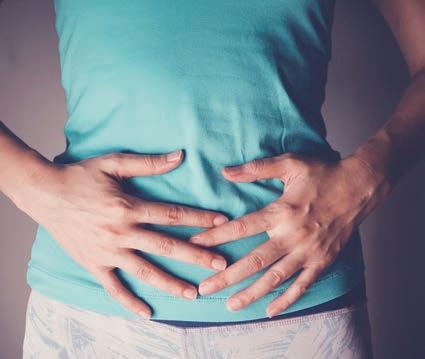
5 minute read
Dietary & Lifestyle strategies to manage constipation
Dietary & Lifestyle strategies to manage constipation BY NICOLE SALIBA
Feeling stuck? Chances are you aren’t alone. Constipation affects roughly 25% of Australians and some people don’t even know that they’re constipated! Most people do not seek medical care or assistance but the good news is that there is lots that we can do to help.
How do I know if I am constipated? Constipation is a condition in which you may have: Less than 3 bowel movements per week Hard, dry or lumpy stools Stools that are difficult or painful to pass A feeling that not all the stool has emptied or an incomplete bowel movement
If you also experience abdominal pain for at least one day per week for at least three months in addition to the above, you have something called constipation–predominant Irritable Bowel Syndrome (IBS–C) which is managed slightly differently.
Book in to see your doctor if you have a sudden onset of constipation, family history of colorectal cancer or are experiencing bleeding, unexplained weight loss or waking up in the middle of the night for bowel movements as these are considered RED FLAGS.
What causes constipation? There are several different factors that can cause chronic constipation, and these tend to vary from person to person.
At Eatsense, we take a personalised approach to helping you overcome your constipation. Constipation much be due to a range of things such as: Low levels of exercise which decreases stimulation of the gut muscles Stress, anxiety and or depression which disrupts communication between the brain and gut Hormonal changes such as those experienced during pregnancy Ignoring the urge to go. The longer poop sits in your bowel, the harder it becomes as water is absorbed from it. A lack of whole–grain fibre which helps bulk up Medications or supplements such as iron supplements, pain medications or some nausea medications Changes to your routine Structural issues such as prolapses or strictures where there is narrowing in the bowel What are some dietary and lifestyle strategies to help manage constipation? Here are some of our top tips for improving constipation. We suggest trialling one at a time for a few days at a time: Aim for three regular meals Manage your stress levels Aim for 7–9hrs sleep Drink 2–3L of water/fluid per day
This will keep your stools soft, and easy to pass. An easy tip is to carry a water bottle around with you, this can remind you to drink more water. Include 30–60 minutes of exercise Include 1–2 kiwifruit per day. Kiwis contain an enzyme called actinidine, this enzyme increases movement in your upper gastrointestinal tract which can help with constipation.
Scientific evidence supports the use of 2 kiwi fruits per day to improve constipation. Include 4–5 prunes per day. Prunes

have been proven to help with constipation. Prunes are high in insoluble fibre, as well as sorbitol, which is considered a natural laxative.
Try to eat 4 to 5 prunes a day to help improve constipation Include salad or vegetables at main meals Aim for a minimum of 25–30g fibre per day. If your baseline intake of fibre is low gradually increase this Focus on your intake of insoluble fibre.
Insoluble fibre does not dissolve in water and speeds up the passage of food and water. Insoluble fibre helps bulk up poops and can help prevent constipation. It is commonly found in whole grains and vegetables. Some
specific foods that are a great source of insoluble fibre, and are proven to improve constipation include ground flaxseed and wheat bran. Trial a Fibre supplement such as psyllium husk or Kfibre Warm or hot cups of tea, coffee and water in morning can help stimulate the bowel Swap refined carbohydrates such as corn flakes and white bread with whole grain, high fibre options Trial a probiotic: There is some evidence to support that probiotics may help relieve constipation and bloating. Probiotics are live micro–organisms that provide health benefits by improving the gut microbiota. Be aware that not all strains of bacteria improve constipation and bloating, your dietitian can help you find the right strain of bacteria and probiotics for you. Make sure you’re sitting on the toilet correctly. Toilet positioning can help reduce the strain from constipation. A squatting position with your knees higher than your hips while sitting on the toilet is recommended to help reduce straining. You can use a step–stool under your feet.
If all the above fails there are certain medications you can trial. Make sure to chat to your pharmacist or doctor prior to commencing any.
If you are having a hard time dealing with your IBS, constipation or gut issues book in with one of our Accredited Practising Dietitians today.

Eatsense is one of the Central Coast’s leading nutrition practices with a strong focus on Women’s Health & Children’s Health.
We are a passionate team of non-judgmental dietitians who thrive on helping our clients. We each have a key interest area including childhood nutrition, chronic disease, sports nutrition, women’s health, gut health, and plant-based nutrition. Our dietitians are passionate about working alongside clients and can assist with: • Chronic disease management including diabetes, heart disease • Women’s health including endometriosis,
PCOS, menopause • Weight management • Fertility, pre–conception and pregnancy nutrition • Paediatric nutrition including food allergies and intolerances, fussy eating • Gut health including Diverticulitis,
Coeliac disease, IBD and IBS • Plant-based diets • Sports Nutrition • Nutritional Psychiatry and supporting clients with mood disorders

If you would like to book in an appointment with one of our friendly team members call 43113623 or book online at eatsense.com.au Erina HQ | West Gosford | Wyong | Kariong | Saratoga | Umina (02) 4311 3623 | hello@eatsense.com.au | eatsense.com.au





